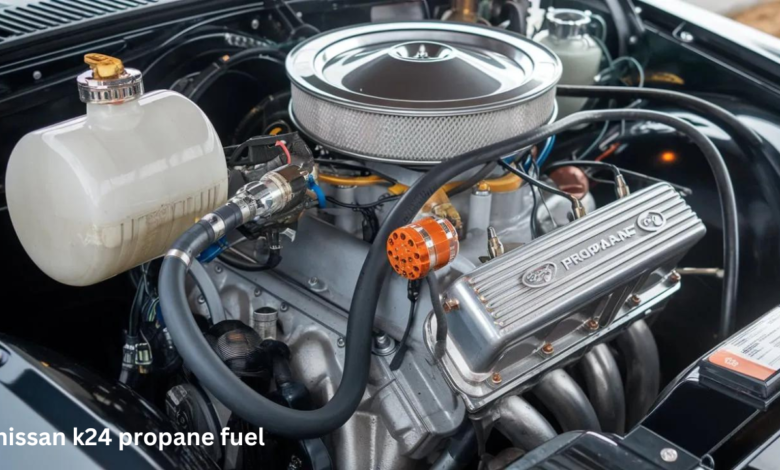Unlocking the Potential of the Nissan K24 Propane Fuel

In recent years, the automotive industry has seen a notable shift towards alternative fuel sources, driven by the need for sustainability, lower emissions, and rising fuel costs. Among these innovative solutions is the Nissan K24 propane fuel, which has captured the attention of eco-conscious drivers and fleet managers alike. In this comprehensive guide, we will explore the features, benefits, and potential of the Nissan K24 propane, along with practical insights on conversion, maintenance, and performance.
Introduction to Propane as an Alternative Fuel
Propane, or liquefied petroleum gas (LPG), has emerged as a viable alternative to gasoline and diesel in various applications, including transportation. Its benefits include:
- Lower Emissions: Propane produces fewer greenhouse gases compared to traditional fuels, making it an environmentally friendly choice.
- Cost-Effectiveness: Propane is often less expensive than gasoline and diesel, providing substantial savings over time.
- Energy Efficiency: Propane engines can deliver comparable or even superior performance in some cases, ensuring you don’t sacrifice power for sustainability.
The Nissan K24 engine, traditionally known for its robust performance in various Nissan models, has been adapted to run on propane, offering an excellent balance of power and efficiency.
Overview of the Nissan K24 Engine
The nissan k24 propane fuel is a 2.4-liter inline-four engine that has been widely used in several Nissan vehicles. Known for its reliability and performance, this engine features:
- Dual Overhead Camshafts (DOHC): This design improves airflow and increases power output.
- Variable Valve Timing: Enhances fuel efficiency and performance across different RPM ranges.
- Lightweight Construction: Contributes to better fuel economy and handling.
Transition to Propane
Becoming a propane system the fuel delivery system of the nissan k24 propane has to be adjusted. This adoption allows the engine to incorporate the benefits associated with propane while maintaining the conventional superior working of an engine.
Benefits of Converting to Nissan K24 Propane Fuel
1. Environmental Impact
One of the most significant advantages of using propane in the Nissan K24 engine is its reduced environmental impact. Propane burns cleaner than gasoline and diesel, emitting:
- Fewer Carbon Dioxide Emissions: Propane produces approximately 12% fewer CO2 emissions compared to gasoline.
- Lower Levels of Carbon Monoxide: This is crucial for urban driving, where air quality is a concern.
- Reduced Hydrocarbon Emissions: Propane minimizes unburned hydrocarbons that contribute to smog.
By converting to propane, drivers can significantly lower their carbon footprint.
2. Cost Savings
Switching to propane can result in substantial cost savings for drivers and fleet operators:
- Fuel Price Advantage: Propane is often less expensive than gasoline, allowing for lower operational costs.
- Tax Incentives: In many regions, governments offer tax breaks and incentives for using alternative fuels, further reducing expenses.
- Maintenance Savings: Propane engines typically require less frequent maintenance, reducing long-term ownership costs.
3. Performance and Efficiency
Despite the switch to propane, the nissan k24 propane fuel maintains impressive performance characteristics:
- Power Output: While some may worry about a decrease in power, propane engines can deliver torque comparable to their gasoline counterparts.
- Engine Longevity: Propane combustion produces fewer contaminants, leading to less wear and tear on engine components.
4. Availability of Infrastructure
Propane dispensing outlets are gradually being extended to most regions particularly the urban centers. These growing infrastructure also do facilitate for the driver to apply transition for propane fuel.
How to Convert the Nissan K24 Propane Fuel
Converting the Nissan K24 engine to run on propane requires several steps. While this process should be conducted by professionals, understanding the general procedure can be beneficial.
1. Assess Compatibility
Before conversion, ensure that the Nissan K24 engine is compatible with propane fuel. Most K24 engines can be converted, but it’s crucial to consult a professional.
2. Install a Propane Conversion Kit
A propane conversion kit typically includes:
- Propane Fuel Lines: Designed to withstand higher pressure.
- Fuel Regulator: Controls the fuel pressure from the propane tank to the engine.
- Fuel Injectors: Specially designed to deliver propane efficiently.
Also Read; EngineFirm.com/
3. Modify the ECU nissan k24 propane fuel
The engine control unit (ECU) must be reprogrammed to accommodate the different fuel characteristics of propane. This ensures optimal performance and fuel efficiency.
4. Install a Propane Tank
Choose an appropriate propane tank that fits your vehicle. Common options include:
- Underbody Tanks: Installed beneath the vehicle, these tanks save cargo space.
- Trunk-Mounted Tanks: Suitable for sedans and smaller vehicles but may limit trunk space.
5. Safety Measures
Ensure that all safety standards are met during installation, including:
- Leak Testing: After installation, conduct thorough leak tests to ensure no propane escapes.
- Emergency Shut-off Valves: These should be installed for added safety.
Maintenance of the Nissan K24 Propane Fuel
Maintaining a nissan k24 propane involves specific practices that differ from traditional gasoline engines.
1. Regular Inspections
Regular inspections should include checking:
- Fuel Lines: Ensure there are no leaks or damages.
- Tank Pressure: Monitor the propane tank pressure to ensure safe operation.
2. Engine Tune-Ups nissan k24 propane fuel
While propane engines require less frequent maintenance, routine tune-ups are still essential to maintain performance:
- Air Filter Replacement: Keep the air filter clean for optimal airflow.
- Spark Plug Inspections: Check spark plugs regularly, as they can become fouled over time.
3. Fuel Quality
Avoid the use of low-standard propane, with a tendency of introducing impurities to the engine. It is known that the quality of propane that is discussed can negatively affect the performance.
Performance Considerations
1. Power and Torque nissan k24 propane fuel
The Nissan K24 engine, when converted to propane, typically experiences minimal changes in power and torque. However, performance can vary based on factors such as:
- Fuel Mixture: The correct air-to-fuel ratio is critical for performance.
- Driving Conditions: Variations in load and terrain can impact engine output.
2. Cold Weather Performance
Propane can sometimes be less efficient in extremely cold temperatures. To mitigate this:
- Use Propane Mixes: Some drivers use a mix of propane and gasoline during winter months for better cold-start performance.
- Engine Block Heaters: Installing heaters can help maintain engine temperature.
Real-World Applications of the Nissan K24 Propane Fuel
1. Fleet Vehicles
Many businesses are transitioning their fleets to propane fuel, citing benefits such as:
- Reduced Operational Costs: Lower fuel prices and maintenance costs lead to significant savings.
- Corporate Responsibility: Many companies aim to reduce their carbon footprint, aligning with sustainability goals.
2. Personal Use
For individual drivers, the Nissan K24 propane engine offers:
- Cost-Effective Transportation: Ideal for those who drive frequently and want to minimize fuel expenses.
- Environmental Consciousness: Drivers concerned about their impact on the environment can feel good about their choice.
Challenges and Considerations
While there are many benefits to using the nissan k24 propane fuel, it’s essential to consider potential challenges:
1. Conversion Costs
The initial cost of converting to propane can be a barrier for some drivers. However, the long-term savings often surpass this initial outlay.
2. Availability of Propane nissan k24 propane fuel
As propane is now being used to fuel vehicles, some states still lacks adequate propane fueling stations. Before going green, one has to consider aspect such as infrastructures in a certain region.
3. Performance Adjustments
Some drivers may need time to adjust to the performance characteristics of a propane engine. Familiarity with the vehicle will help in optimizing driving habits for efficiency.
Conclusion
The Nissan K24 propane fuel is an example of how change ad can be made for an improved and efficient green economy. Now, drivers and other stockholders can be able to weigh the pros, cons, easy maintenance of propane fuel and come up with decisions that are in harmony with their belief and pocket. With the changing trends around the automobile market, incorporation of other fuels such as propane not only serves the purpose of conserving the environment but also serves a real world use for car owners and companies as well. Regardless of the acquisition of services as a fleet manager who needs to minimize expenses or as a personal client who cares about the environment, the Nissan K24 propane is good for the future. It is time to open the new page and expand the application of propane fuel and discover its possibilities.





